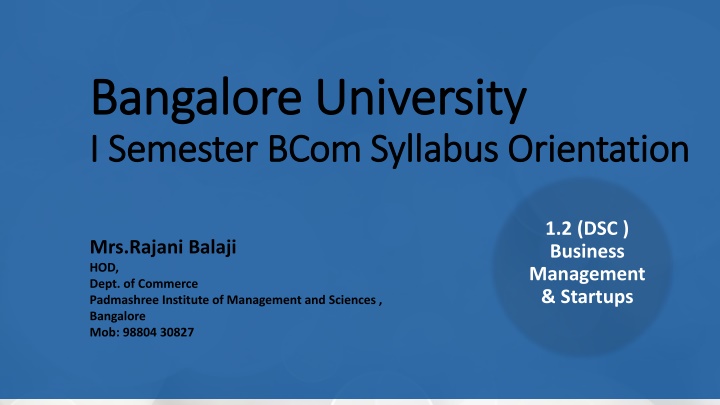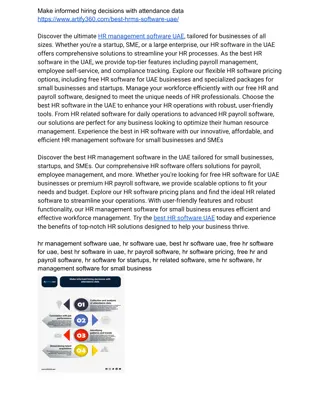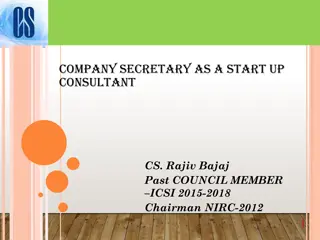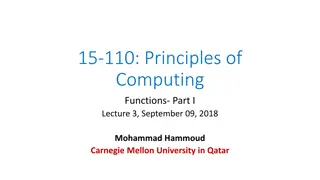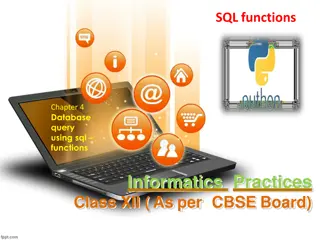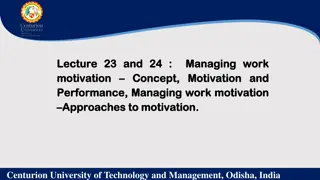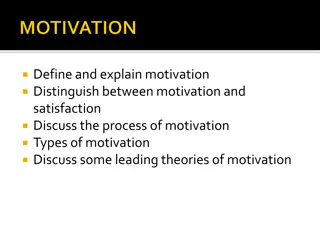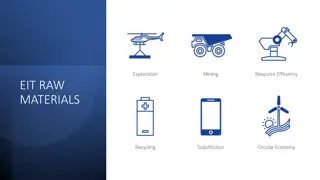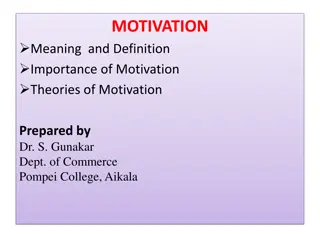Business Management & Startups: Principles, Functions, Leadership, and Motivation
This orientation syllabus for the 1st semester BCom course at Bangalore University covers essential topics like strategic planning, motivation factors, leadership styles, and startup opportunities. Modules delve into management principles, functions, leadership theories, and contemporary motivation concepts. Skill development activities involve analyzing planning and organizational structures in business settings. The course aims to equip students with the knowledge and skills necessary for managing organizations, leading teams, and understanding startup dynamics in India.
Uploaded on Oct 01, 2024 | 4 Views
Download Presentation

Please find below an Image/Link to download the presentation.
The content on the website is provided AS IS for your information and personal use only. It may not be sold, licensed, or shared on other websites without obtaining consent from the author.If you encounter any issues during the download, it is possible that the publisher has removed the file from their server.
You are allowed to download the files provided on this website for personal or commercial use, subject to the condition that they are used lawfully. All files are the property of their respective owners.
The content on the website is provided AS IS for your information and personal use only. It may not be sold, licensed, or shared on other websites without obtaining consent from the author.
E N D
Presentation Transcript
Bangalore University Bangalore University I Semester I Semester BCom BCom Syllabus Orientation Syllabus Orientation 1.2 (DSC ) Business Management & Startups Mrs.Rajani Balaji HOD, Dept. of Commerce Padmashree Institute of Management and Sciences , Bangalore Mob: 98804 30827
1.2 Business Management & 1.2 Business Management & Startups Startups Course Credits : 4 Credits No. of Hours per week : 4 Hrs Total No. of Teaching Hours : 56 Hrs
Course Outcomes Course Outcomes Design and demonstrate the strategic plan for the attainment of organizational goals. Compare and choose the different types of motivation factors and leadership styles. Understand startups Opportunities and Financial Issues of Startups Understand the support extended by Incubators & Major Startups Incubators in India. Understands Government Initiatives for Startups in India.
Module 1: Principles & Functions of Management Introduction Meaning Definitions Importance & scope of management - Principles of Management. Managerial Functions: Meaning, Definition, Characteristics, benefits & Limitations of Planning, organizing, Directing, Coordinating & Controlling - Task & Responsibilities of Professional Manager. 12 Hrs
Module 1: Skill Developments Activity Visit any business organization and collect the information on types of planning adopted by them & organizational structure Blended Learning Use pre-made videos from online sources Pedagogy
Module No. 2: Leadership & Motivation Leadership: concept Importance Major Theories of leadership (Likert s scale Theory, Blake & Mouton's Managerial Grid theory, House Path Goal theory, Fred Fielder s situational leadership). Modern Leadership styles in the changing world (Charismatic leadership, Transformational leadership, Visionary Leadership, Transactional Leadership, Servant Leadership, Situational Leadership). Motivation: Concept & importance of Motivation Contemporary Motivation Theories (Expectancy Theory, Equity Theory, Goal Setting Theory, Reinforcement theory) 14 Hrs
Module 2: Skill Developments Activity Analyse the leadership styles of any select five companies of different sectors Flipped Classrooms Use pre-made videos from online sources Case studies based teaching Storytelling Pedagogy
Module No. 3: Startups & Its Financial Issues Introduction- Meaning Features Types of Startups Ideation Design Thinking, Entrepreneurship Lessons for Startups, 3 Pillars to Initiate startup (Handholding, Funding & Incubation). Startup Financial issues: feasibility Analysis- The cost & Process of Raising capital Unique Funding issues of a High tech Ventures funding with equity Financing with debt funding strategies with bootstrapping Crowdfunding Venture Capital. 10 Hrs
Module 3: Skill Developments Activity Prepare a Business Plan for startups Use pre-made videos from online sources Case studies based teaching Mini Project-Based Learning Pedagogy
Module No. 4: Module No. 4: Incubation Support to startups Introduction- Meaning & definition of Incubation support Objectives & Functions of Incubation Centers - Services Types Incentives for Incubators Role of Incubators in startup Policy, List of Major Startups Incubators in India - Case studies on Startups. 10 Hrs
Module 4: Skill Developments Activity List out Major Startups Incubators In your State
Module No. 5: Module No. 5: Government Initiatives for Startups in India Government Initiatives Startup India Initiative, Seed Fund ASPIRE SAMRIDDHI Scheme Mudra Scheme (Sishu, Kishore & Tarun) ATAL Innovation Mission MSME Multiplier Grants Scheme Credit Guarantee fund trust for micro & small business Software Technology Park Venture Capital Assistance Scheme Single Point Registration scheme M-SIPS Self Employment & Talent Utilization (SETU) 10 Hrs
1. 2. 3. 4. 5. Startup India Initiative, www.startupindia.gov.in/ ASPIRE https://msme.gov.in/sites/default/files/ASPIRE_EN.pdf Mudra Scheme (Sishu, Kishore & Tarun) https://www.mudra.org.in/ ATAL Innovation Mission https://aim.gov.in/ MSME Multiplier Grants Scheme https://www.meity.gov.in/content/multiplier-grants- scheme Credit Guarantee fund trust for micro & small business https://www.cgtmse.in/Home/VS/3 Venture Capital Assistance Scheme https://www.startupindia.gov.in/content/sih/en/government-schemes/venture-capital- scheme.html & https://taxguru.in/finance/analysis-venture-capital-assistance-scheme- entrepreneurs.html Single Point Registration scheme https://www.nsic.co.in/schemes/Single-Point- Registration.aspx M-SIPS https://www.msips.in/MSIPS/HomePage 10. Self Employment & Talent Utilization (SETU) - https://www.startupindia.gov.in/content/sih/en/government-schemes/setu_scheme.html 11. Seed Fund https://seedfund.startupindia.gov.in/ 12. SAMRIDDHI Scheme -/- 6. 7. 8. 9.
Module 5: Skill Developments Activity Visit to Nearest Bank or Financial institution and prepare a Report on Financial Incentives Provided to startups Explicit teaching through lectures Pedagogy
Thank you! Thank you!
Startup India Initiative Startup India is a flagship initiative of the Government of India, intended to build a strong eco-system for nurturing innovation and Startups in the country that will drive sustainable economic growth and generate large scale employment opportunities. The Government through this initiative aims to empower Startups to grow through innovation and design. In order to meet the objectives of the initiative, Government of India is announcing this Action Plan that addresses all aspects of the Startup ecosystem. With this Action Plan the Government hopes to accelerate spreading of the Startup movement
ASPIRE A Scheme for Promotion of Innovation, Rural Industries and Entrepreneurship (ASPIRE) aids to set up a network of technology centres and to set up incubation centres to accelerate entrepreneurship and also to promote startups for innovation in agro-industry. ASPIRE provides financial support to set up Livelihood Business Incubators (LBI) or Technology Business Incubator (TBI). Objectives Create new jobs and reduce unemployment Promote entrepreneurship culture in India Grassroots economic development at the district level Facilitate innovative business solution for unmet social needs Promote innovation to further strengthen the competitiveness of MSME sector
Mudra Scheme Micro Units Development & Refinance Agency Ltd (MUDRA) is an NBFC supporting development of micro enterprise sector in the country. MUDRA provides refinance support to Banks / MFIs / NBFCs for lending to micro units having loan requirement upto 10 lakh. MUDRA provides refinance support to micro business under the Scheme of Pradhan Mantri MUDRA Yojana.
Atal Innovation Mission Atal Innovation Mission (AIM), NITI Aayog is Government of India s flagship initiative to promote a culture of innovation and entrepreneurship in the country and was setup in 2016. Towards this end AIM has taken a holistic approach to ensure creation of a problem-solving innovative mindset in schools and creating an ecosystem of entrepreneurship in universities, research institutions, private and MSME sector. All the initiatives of AIM are currently monitored and managed systematically using real-time MIS systems and dynamic dashboards. AIM is also currently having its programs reviewed by third party agencies for ensuring continuous improvements.
Multiplier Grant Scheme Multiplier Grant Scheme MGS aims to encourage collaborative R&D between industry and academics/ R&D institutions for development of products and packages. Under the scheme, if industry supports R&D for development of products that can be commercialized at institution level, then government will also provide financial support that is up to twice the amount provided by industry. The proposals for getting financial support under the scheme are to be submitted jointly by the industry and institutions.
Credit Guarantee fund trust for micro & small business Credit Guarantee Fund Trust for Micro and Small Enterprises (CGTMSE) is jointly set up by Ministry of Micro, Small & Medium Enterprises (MSME), Government of India and Small Industries Development Bank of India (SIDBI) to catalyse flow of institutional credit to Micro & Small Enterprises (MSEs). Credit Guarantee Scheme (CGS) was launched to strengthen credit delivery system and to facilitate flow of credit to the MSE sector, create access to finance for unserved, under-served and underprivileged, making availability of finance from conventional lenders to new generation entrepreneurs.
Venture Capital Assistance Scheme Venture Capital Assistance Scheme or VCAS is financial support in the form of an interest free loan provided by SFAC to qualifying projects to meet shortfall in the capital requirement for implementation of the project. The primary aim of the scheme is to target Agri Business entrepreneurs through financial participation. It targets following people : Farmers Self Help Groups Producer Groups Companies Agriculture Exporters Units in agriexport zones Agriculture graduates either individually or collectively to start a agribusiness projects. Partnerships or Proprietory Firm
Single Point Registration Scheme NSIC enlists Micro & Small Enterprises (MSEs) under Single Point Registration scheme (SPRS) for participation in Government Purchases. The units enlisted under Single Point Registration Scheme of NSIC are eligible to get the benefits under Public Procurement Policy for Micro & Small Enterprises (MSEs)
M-SIPS The Electronic MSIPS (e-MSIPS) Application System enables online submission and scrutiny of applications submitted to the Ministry of Electronics and Information Technology (MeitY) under the Modified Special Incentive Package Scheme (MSIPS) and Electronics Manufacturing Cluster (EMC) schemes. Registered users can submit their applications in the system, using the forms designed for the same. The system will enable online scrutiny of applications and online generation of responses to the applicant.
Self Employment and Talent Utilisation (SETU) Niti Aayog SETU will be a Techno-Financial, Incubation and Facilitation Programme to support all aspects of start up businesses, and other self-employment activities, particularly in technology-driven areas. It aims to create around 100,000 jobs through start-ups. Scheme Benefits & Highlights An amount of INR 1,000 crore is being set up initially in NITI Aayog for SETU for setting up of incubation centres and enhance skill development to facilitate the startup ecosystem in the country while improving the ease of doing business. This scheme aims at increasing the number of startups by incubation and extending other services for reducing the rate of unemployment in the country.
